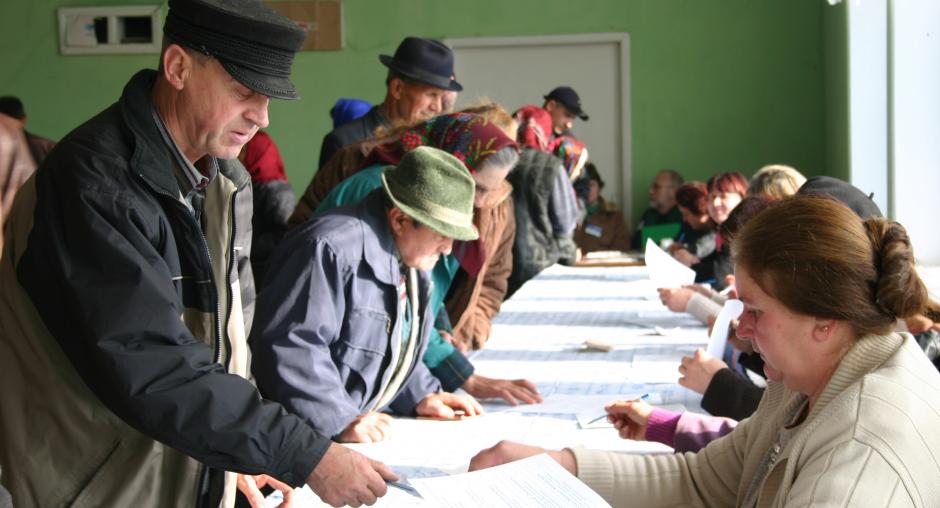Newsroom
OSCE Moldova Mission: elections for Gagauz governor improved, but unequal conditions mar campaign
CHISINAU 4 December 2006

(OSCE/Claus Neukirch)Voters in Moldova's autonomous Gagauz region cast their ballots during the 3 December 2006 elections of a new Bashkan (Governor). (OSCE/Claus Neukirch) Photo details
CHISINAU, 4 December 2006 - Ambassador Louis O'Neill, the Head of the OSCE Mission to Moldova said today that the 3 December elections for the Bashkan (Governor) of Gagauzia were held in a generally calm manner and that voting procedures improved in comparison with earlier elections, but regrets that the candidates did not enjoy equal campaign conditions.
"We commend the Gagauz electoral authorities for the improvements in the administration of these elections," Ambassador O'Neill said. "We are concerned, however, about the uneven playing field for candidates during the election campaign."
During the pre-election period, the Mission noted significant support being given to the incumbent Bashkan by regional state-funded media, representatives of local and central authorities, as well as by the ruling party.
All candidates did have access to the media and were able to take part in televised debates on Teleradio Gagauzia. The value of these debates was greatly diminished, however, by the refusal of the incumbent to participate and by the low strength of the broadcasting signal during most of the pre-election period. The leadership of Teleradio Gagauzia has failed to offer a credible explanation for these alleged technical problems.
Law enforcement organs also hampered the campaign activities of opposition candidates. The seizure on 28 November of 5,000 copies of a newspaper supporting one opposition candidate stands out in this regard.
Although Mission Members noted a number of irregularities and shortcomings on polling day, they concluded that the implementation of voting procedures has improved considerably in comparison with earlier elections in the region.
"Proper voting procedures were generally followed. The great number of voters introduced on supplementary lists is, however, a reason for serious concern. Local authorities must do more to ensure that voters' lists are accurate and complete," Ambassador O'Neill said.
In the report, the OSCE Mission Head also noted serious inconsistencies, as well as contradictory and ambiguous provisions in the Gagauz Law on Bashkan Elections, which required urgent attention. "In particular, the current regulations do not provide a clear framework for the registration of candidates and do not ensure the formation of impartial election bodies," he said.
"These legal shortcomings and the other irregularities noted indicate that further efforts need to be taken by the authorities of Gagauzia to ensure that OSCE Commitments and other international standards are met."
Following an invitation from the Moldovan Foreign Ministry and the Gagauz People's Assembly, the OSCE Mission conducted an assessment of the electoral process. Mission Members closely followed the electoral preparations and visited 59 polling stations out of 64 on Election Day. They also closely followed counting procedures in five locations after the polls closed.
The Mission also plans to follow the run-off polls between the two strongest candidates scheduled for 17 December.
"We commend the Gagauz electoral authorities for the improvements in the administration of these elections," Ambassador O'Neill said. "We are concerned, however, about the uneven playing field for candidates during the election campaign."
During the pre-election period, the Mission noted significant support being given to the incumbent Bashkan by regional state-funded media, representatives of local and central authorities, as well as by the ruling party.
All candidates did have access to the media and were able to take part in televised debates on Teleradio Gagauzia. The value of these debates was greatly diminished, however, by the refusal of the incumbent to participate and by the low strength of the broadcasting signal during most of the pre-election period. The leadership of Teleradio Gagauzia has failed to offer a credible explanation for these alleged technical problems.
Law enforcement organs also hampered the campaign activities of opposition candidates. The seizure on 28 November of 5,000 copies of a newspaper supporting one opposition candidate stands out in this regard.
Although Mission Members noted a number of irregularities and shortcomings on polling day, they concluded that the implementation of voting procedures has improved considerably in comparison with earlier elections in the region.
"Proper voting procedures were generally followed. The great number of voters introduced on supplementary lists is, however, a reason for serious concern. Local authorities must do more to ensure that voters' lists are accurate and complete," Ambassador O'Neill said.
In the report, the OSCE Mission Head also noted serious inconsistencies, as well as contradictory and ambiguous provisions in the Gagauz Law on Bashkan Elections, which required urgent attention. "In particular, the current regulations do not provide a clear framework for the registration of candidates and do not ensure the formation of impartial election bodies," he said.
"These legal shortcomings and the other irregularities noted indicate that further efforts need to be taken by the authorities of Gagauzia to ensure that OSCE Commitments and other international standards are met."
Following an invitation from the Moldovan Foreign Ministry and the Gagauz People's Assembly, the OSCE Mission conducted an assessment of the electoral process. Mission Members closely followed the electoral preparations and visited 59 polling stations out of 64 on Election Day. They also closely followed counting procedures in five locations after the polls closed.
The Mission also plans to follow the run-off polls between the two strongest candidates scheduled for 17 December.
